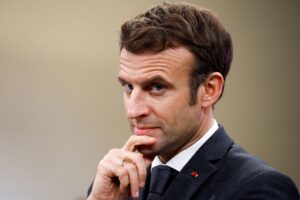With France facing its worst political crisis since 1968, most of its citizens know exactly whom to blame: President Emmanuel Macron, whose tumbling approval levels hit just 23% even before the no-confidence vote that toppled his latest government. Across the political spectrum, Macron is seen as an aloof, uncaring elitist whose arrogance and overconfidence has led him to make one disastrous miscalculation after another.
His talent for miscalculation is undeniably impressive. His high-handed dissolving of parliament in the summer produced a hopelessly divided National Assembly which lasted just three months — the shortest on record for the Fifth Republic. Macron now has the near-impossible task of finding a new Prime Minister who can manage the same Assembly, pass a budget, and address accelerating economic woes. Sisyphus had an easier time of things, and, at this point, if the boulder of political impossibility rolls back over Macron, crushing his presidency and forcing his resignation, most of the French will cheer.
But does Macron really bear the biggest share of blame? France is hardly the only Western democracy in crisis. The United States just elected Donald Trump to a second term. Germany is in political meltdown. In Britain, Reform has moved ahead of Labour in the polls. Everywhere, it seems, populist forces have the whip hand. Nor did Macron single-handedly spur the rise of France’s hard-Right. The party then called the National Front began its steady advance in the Eighties, when he was still in primary school. The first Le Pen to make it into the final round of a presidential election was Marine’s ghastly father Jean-Marie, 22 years ago.
And the French are not just angry at Macron. According to a striking poll published this week by Le Grand Continent, fully 43% of them think EU membership hurts France, 46% think the Union is corrupt, and 26% want to see France leave it at once — the highest figure on record, and astonishing for the country at the heart of the European project. So perhaps Macron is not Sisyphus, suffering divine punishment for his misdeeds, but just another hapless victim in the path of a tidal wave.
Perhaps. But individual actions have played an important role in all these countries’ recent political misfortunes. Think, for instance, of Joe Biden’s disastrous decision to remain in the 2024 presidential race until it became too late for the Democrats to recover. It is always possible to make a bad situation much worse. And ever since Emmanuel Macron’s first election in 2017, he has shown a remarkable talent for doing so.
Much of the problem goes back to his misinterpretation of the French presidency itself. When he was still Economics Minister to Socialist President François Hollande in 2015, Macron gave a strange speech in which he spoke of the inherent “incompleteness” of French democracy, thanks to an “absence” at its heart — the absence of a king. Referring to the execution of Louis XVI well over two centuries ago, he mused that “the Reign of Terror left an emotional, psychic, collective vacuum: The King is gone!” But, he suggested, the regal presidency created by Charles de Gaulle for the Fifth Republic in 1958 had the capacity to fill the gap, providing France with impartial, unifying, Olympian leadership, far above the political fray. During his victorious 2017 campaign, Macron mused about governing in a “Jupiterian” fashion, and his first official portrait as President showed him posing at a Louis XV-style desk, with de Gaulle’s memoirs prominently displayed on it. He summoned the two chambers of parliament to hear him speak at the former royal palace of Versailles.
But 2017 was not 1958, and Macron was no de Gaulle. In 1958, France had been a broken country: the short-lived Fourth Republic was utterly paralysed, the colonial empire was dissolving, and the bitter struggle for Algerian independence had raised the spectre of civil war. De Gaulle himself was a towering, heroic war leader whose political movement, while broadly conservative, included many different ideological tendencies. He could, in fact, play the king, and did so quite successfully until the tumult of 1968. But by 2017, the Fifth Republic had settled into political banality, with persistent but manageable economic stresses and party squabbling. The incumbent, François Hollande, had promised to serve as a “normal president” — de Gaulle would have shuddered at the expression — and although he was widely mocked for his failures, he was not hated. Macron, meanwhile, was an almost entirely untested 39-year-old who had never run for office. He was a chemically pure product of France’s ultra-elite educational institutions and possessed a full share of the excessive self-confidence they so often instil in their graduates. His vision of politics was largely intellectual — or, rather, pseudo-intellectual (he had retained just enough from his early philosophy studies to sound learned in the subject without really being so).
Still, for a time, his youth and vigour excited support. His promise to govern from the centre, balancing neoliberal reforms with a strengthening of the social safety net, raised the hope he might move past politics as usual. And with the Socialists and the neo-Gaullists both in a state of collapse after a failed presidency for each (those of Hollande and his predecessor Nicolas Sarkozy), Macron won the 2017 election, handily defeating Marine Le Pen in the second round. Foreign observers swooned. In 2018, Politico even titled a story “How Emmanuel Macron Became the New Leader of the Free World”.
But soon enough, his desire to play the king, and to lecture the French on what was good for them, eroded the good will. For all his talk of the social safety net, Macron was at heart a neoliberal who believed France had to be shaken out of its bad old statist ways to become competitive in the world economy (he had spent formative years at the Rothschild investment bank). If doing so caused people to lose jobs, well, they could always reboot. In September 2018, when an agricultural worker complained to him about being unable to find a job, Macron told the man to retrain in the service sector. “You’ve got to do it!… I could cross the street and find you a job right now.” Within his first year in office his government overhauled the labour code, making it easier for employers to fire workers, and abolished a “solidarity tax” on the wealthy — all in the name of economic efficiency. And, warning of climate change, Macron approved a large hike in gasoline taxes, in a country where gas already cost more than twice as much as in the United States (and average household income was 40% lower). That last decision triggered the furore of the Gilets Jaunes whose dramatic and sometimes violent protests brought hundreds of thousands into the streets. The movement only subsided with the arrival of the pandemic in early 2020.
The protests did not leave Macron chastened. Indeed, in the years after the Gilets Jaunes revolt he sometimes seemed to take seriously Bertolt Brecht’s quip that “the government should dissolve the people and elect another”. The people reciprocated the disdain, and in early 2022, after a small pandemic rebound, his popularity had fallen to 37%. Even so, without a viable opponent from outside the extremes, he tottered to reelection that spring. But the enthusiasm that had marked his first victory was long gone. Marine Le Pen received over 40% of the vote, and in the parliamentary election that followed, the National Rally scored the greatest success of any hard-Right party since the 19th century. Macron was forced to govern without a parliamentary majority, but even so, he continued to pursue a program of austerity. Article 49.3 of the Fifth Republic’s Constitution allows governments to enact laws by decree, and Macron’s third Prime Minister, Élisabeth Borne, resorted to it 23 times during her 20-month tenure between 2022 and 2024. Most controversially, she did so to pass a hugely unpopular measure that raised the retirement age from 62 to 64. It provoked further massive protests, eventually led to Borne’s replacement by Gabriel Attal, and contributed to the National Rally’s European election breakthrough. If the Rally then failed to gain a parliamentary majority, the credit lay not with Macron, but with the Left-wing parties that hastily organised themselves into a New Popular Front, winning a plurality of seats in the National Assembly.
It is probably unfair to criticise Macron for mishandling the political situation since the summer because, in truth, no one could have handled it successfully. He chose to tack Right, picking a conservative hardliner on immigration, Barnier, as his third Prime Minister of the year, and relying on the National Rally’s tacit support to stave off a no-confidence vote. But facing a fiscal crisis, with France’s national debt having risen far past the caps mandated by the EU, Barnier tried to make severe cuts to the social security budget. Although he backtracked on many of them in the face of criticism from Le Pen, last week he still had to resort to article 49.3 to pass the bill. Two days later the National Rally and the New Popular Front came together to vote a French government out of office for the first time since 1962. In joining forces with the Left, Le Pen had a clear ulterior motive, since she is currently on trial for misusing public funds and in March faces both a possible jail sentence and a five-year ban from electoral office. She would love to force Macron’s resignation and a new presidential election before that occurs.
Macron’s reaction to the defeat, meanwhile, has been, well, classic Macron. In a speech on Thursday, he ruled out resignation, and, while acknowledging his overall responsibility for the political situation, also said that his decision to dissolve parliament in the summer had been “misunderstood”. And he added that he would never accept blame for the “irresponsibility of others, especially members of parliament who have chosen in good conscience to torpedo the budget and the government of France a few days before Christmas”. He called them an “anti-republican front”. Charles de Gaulle, in his day, also grumbled at the ingratitude of the French. Yet when he lost a referendum in 1969, he took responsibility and resigned. That is a lesson that Macron has obviously not learned.
In the conclusion to his speech, Macron changed his tone. He boasted of his success in hosting the Paris Olympics, and in rebuilding the Cathedral of Notre-Dame, which reopened to the public in a grand ceremony on Saturday. “This reconstruction that was thought impossible… Well, we have managed it.” And he finished with a flourish: “Wherever the Nation has grown fragile, rebuild it; wherever outbursts and insults have raged, restore wisdom; wherever there is division, choose unity; wherever some yield to anguish, bring hope.” It was grand, beautiful rhetoric, worthy of a king, just as the stunning reconstruction of Notre Dame is a project worthy of a French king.
Emmanuel Macron still longs to be that regal, Jupiterian figure. But this vision of the presidency was already long past its sell-by date when he first ran for office, and in the seven years since it has only grown more stale, more inappropriate, and more profoundly irritating to the French people. Notre-Dame, and pictures of him alongside Trump and Zelensky, has brought a small rebound in his popularity, but it is very unlikely to last. Whether or not he finishes out his second term, his legacy is not a pretty one, and if he doesn’t deserve all the blame for France’s current political shambles, he still deserves a very large share of it. On this issue, the French people have it exactly right.
Disclaimer
Some of the posts we share are controversial and we do not necessarily agree with them in the whole extend. Sometimes we agree with the content or part of it but we do not agree with the narration or language. Nevertheless we find them somehow interesting, valuable and/or informative or we share them, because we strongly believe in freedom of speech, free press and journalism. We strongly encourage you to have a critical approach to all the content, do your own research and analysis to build your own opinion.
We would be glad to have your feedback.
Source: UnHerd Read the original article here: https://unherd.com/




